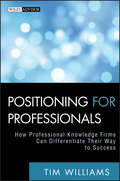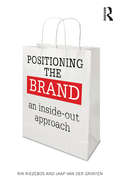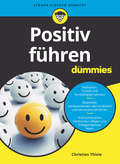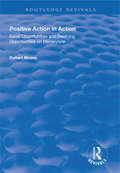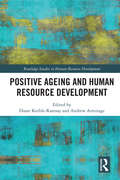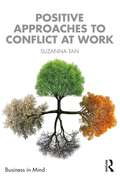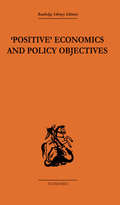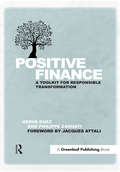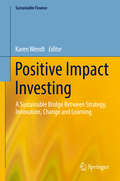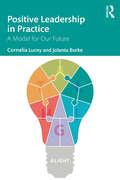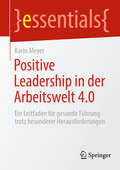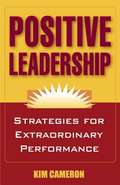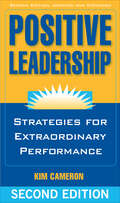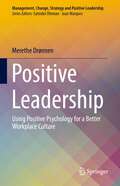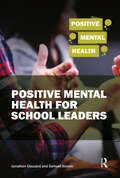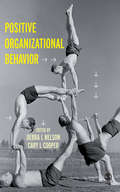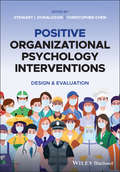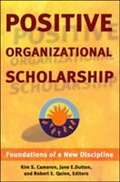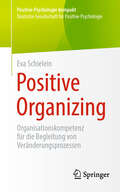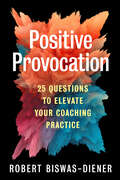- Table View
- List View
Positioning for Professionals: How Professional Knowledge Firms Can Differentiate Their Way to Success (Wiley Professional Advisory Services #6)
by Tim WilliamsIt's not the best companies that prevail in the marketplace, but rather the best brands. The goal of business strategy is not just to be better, but different. Learn how to build a differentiating value proposition by clearly and carefully defining your brand boundaries: Calling, Competencies, Customers, and Culture. Positioning for Professionals shows how a well-defined value proposition can help professional service firms create their own success instead of copying the success of others, including such concepts as: How and why professional service brands become homogenized Why standing for everything is the same as standing for nothing Why there's no such thing as full service Deep and narrow as a strategic imperative Why it's better to be a profit leader than a market leader Differentiation and price premiums How to map your brand on the matrix of relevance and differentiation How to define a value proposition that will make your firm intensely appealing to the customers who want you for what you do best Based on the proven premise that the most profitable business strategy is not to aim at the center of the market, but rather at the edges, Positioning for Professionals is written for leaders, managers, and other senior executives of service companies in with a particular emphasis on professional service firms.
Positioning the Brand: An Inside-Out Approach
by Rik Riezebos Jaap van der GrintenPositioning is hot. Not only in the realm of consumer goods manufacturers, but also for other companies, institutions, governments and even individual persons. An explosion of good quality products on the market and targeted media and advertising campaigns has led to an increasing interest from organizations as to how to strategically position their brand. Up to now, only a few books on positioning were published. Positioning the Brand picks up the gauntlet with an approach based on two fundamental choices: Firstly, the book was written from the perspective of the brand manager, and has therefore been shaped as a practical roadmap. Secondly, this book advocates a new stance on positioning, teaching the reader to look from the inside-out, instead of adopting the usual outside-in methodology. This inside-out approach departs from an analysis of the corporate identity, enabling better fulfilment of external positioning, and ensuring internal support. This book is intended for (future) managers, marketing professionals and communication professionals responsible for the commercial success and reputation of a brand. The contents have a practical set-up, reinforced by engaging examples, and enable the reader to individually complete a positioning process.
Positiv führen für Dummies (Für Dummies)
by Christian ThieleIst es Ihnen wichtig, dass Arbeit Ihnen und auch Ihrem Team Freude macht? Haben Sie Vertrauen zu Ihren Mitarbeitern, kennen Sie deren Stärken und setzen Sie diese gezielt ein? Möchten Sie, dass Ihre Mitarbeiter verstehen, wofür Sie arbeiten und die Werthaftigkeit ihres Tuns erkennen? Dann sind Ihnen die Grundprinzipien des Positiven Führens bereits vertraut. Christian Thiele erklärt Ihnen, wie Sie sich, Ihr Team oder auch das ganze Unternehmen mit dieser modernen Form von Führung motivieren und so gemeinsam Ihre Ziele erreichen. Und Ihren gemeinsamen Erfolg dann kräftig feiern, denn auch das gehört zum Positiven Führen!
Positive Action in Action: Equal Opportunities and Declining Opportunities on Merseyside (Routledge Revivals)
by Robert MooreFirst published in 1997, this volume describes very clearly the various government policies to promote equal opportunity and the context of urban policy in which they have to be implemented. Robert Moore’s important study addresses the key issue of equal opportunities through a case study of events when a change in government policy appeared to hold out the prospect of new jobs for a highly deprived inner city area. It is a model for all social research of this kind. The result is a very detailed and objective analysis of the problem of implementing equal opportunity policies in practice.
Positive Ageing and Human Resource Development (Routledge Studies in Human Resource Development)
by Diane Keeble-Ramsay Andrew ArmitagePositive Ageing and Human Resource Development seeks to introduce readers to some of the major cultural issues that the current demographic changes of the workforce as the national default retirement age within the UK has moved from 60 to 67 and beyond represent for the workplace. This phenomenon is happening in other economies. It recognises there are social shifts in terms of the psychological contract and expectations of different sets of workers. Rather than seeking to extend ideas around multi-generational research eg millennials and generation X/Y, it provides some contributions and commentary which may inform employers, HR professionals and those interested in Human Resource Development (HRD) when considering how to plan for these challenges. It considers the concerns that HRD thinking has largely been focussed upon the development of leaders or managing people, rather than how such sociological shifts may impact upon the nature of work and subsequent productivity. It recognises that many companies have failed to plan their people management strategies and talent management approaches to cope with this shift largely given their uncertainty how to address. It takes a set of contributions then, which focus upon different issues broadly based around age, in order to provide illustrations of some of the areas for discourse of the lived experiences of those affected by the probability of working into their late 60s or potentially even late 70s. Much of this is focussed around women’s working lives as the impact of later working represents a number of peculiar issues around the valuing of women’s work and its contributions.
Positive Approaches to Conflict at Work (Business in Mind)
by Suzanna TanHow can we sensitively manage different types of conflict to create a more harmonious and efficient workplace?Workplace conflict can arise when people with different backgrounds or values disagree on approaches, interests, and ideas. This can result in inefficient collaboration and may even impact workers’ mental health. This book covers a range of scenarios around how conflict at work can manifest and discusses approaches to managing these in the right way to improve motivation, productivity, and the overall well-being of employees. It explores contemporary research, theory, and models, and includes exercises for critical reflection to aid understanding. In so doing, it encourages leaders to take responsibility for addressing different types of conflict and how to do so with sensitivity. It also signals when other approaches, such as coaching, mentoring and mediation may be necessary and, when appropriate, signposts to internal formal processes such as disciplinary and grievance procedures.This accessible and practical book assists business owners, managers, and leaders in effectively navigating conflict management within the work environment.
Positive Economics and Policy Objectives (Routledge Library Editions)
by T.W. HutchisonThis book examines important issues on the relationship between economics and political values or ideologies, by analysing the main branches of economic theory in an historical perspective and their impact on economic policy.The book is structured as follows:Part I: Positive Economics?1. The Positive-Normative Distinction in the History of Economic ThoughtPart II: Policy Objectives2. The Objectives of Economic Policies: An Historical Review
Positive Energy Buildings: Concepts, Challenges and Opportunities (Green Energy and Technology)
by Francesco Reda Rita Lavikka Hassam Ur Rehman Abdul Samad KaziThis book investigates positive energy buildings (PEBs). It provides and describes them, explains why they are important in the fight against climate change and discusses how they might be implemented. This book begins by contextualizing PEBs, discussing concepts, definitions and how they may be included by planning authorities in development plans. It then thoroughly explains what PEBs are and their impact on a climate-neutral economy. The book discusses technological, economic, societal and regulatory challenges and opportunities in employing PEBs, before concluding with possible scenarios for implementing them. This book is of use to researchers, practitioners, and policy makers interested in local and decentralized energy, as well as plans to achieve carbon neutrality.
Positive Ethics in Economics: Volume 14, Praxiology: The International Annual of Practical Philosophy and Methodology (Praxiology Ser. #Vol. 14)
by Jérôme Ballet Damien BazinEconomics is often accused of being "a-ethical" - lacking a moral perspective - if not altogether immoral. Its detractors criticize economic models of pure and perfect competition, and claim that economics should be concerned with social effects and strive to be equitable. Yet, these critics fail to understand that the discipline has many dimensions. Economics has also developed a group of concerns directly related to ethics. The presence of practical ethics is evident in the economic analysis of behaviour that incorporates ethical preference, altruism, and a responsible calculation based on norms. It is fair today that economics differentiates ethics from purely financial matters, and the discipline can be associated with morality in man's daily life. Volume 14 of the distinguished "Praxiology" series, examine the concept of positive ethics in economics. While normative ethics moralizes economics, trying to render it more "just," positive ethics is first and foremost a model for the construction of theoretical economic reasoning: it reflects on ethical practices within economics, and introduces a model of reasoning that takes individual ethical behaviour and its after-effects into account. The book is divided into three parts. In "Altruism," the contributors discuss the notion of unselfish concern for the welfare of others, and its place in economic practice. In "Commitment," the authors discuss reason as being central to economic theory, as well as the position of ethical behaviour. In "Responsibility," the idea that man is not an island unto himself, but a being involved in a set of relationships, is examined. If a person is simultaneously responsible for himself and others, then how far does his responsibility extend? "Essays on Positive Ethics in Economics" is thought-provoking volume that will be of interest to economists, policymakers, philosophers, and students of ethics and morality.
Positive Finance: A Toolkit for Responsible Transformation
by Hervé Guez Philippe ZaouatiFor some, finance is the enemy: solely responsible for the global financial crisis and symbolic of an outdated model that is catapulting us toward social and ecological ruin. Such a view can seem tempting. The 2007-2008 meltdown of the financial system was intimately bound to the financialization of the economy and its consequences. However, in reality the crisis in finance is an indicator that our economic model is obsolete. It is possible to imagine another way, which would consist of seeing finance as a “toolkit” for building a solution to the crisis.Positive Finance presents a way to transform the economic model and reduce the ever-widening gulf of inequality, while taking into account environmental constraints. In order to achieve this, the authors argue that we must re-envision the allocation of capital in order to support social and technological innovations, to design and build sustainable infrastructure, and to finance the energy transition. Reinvented, finance could become a powerful lever for setting these transformations in motion. This book is dedicated to proving that such leverage is within reach: here, the authors present a toolkit for putting money to work in the general interest.
Positive Impact Investing: A Sustainable Bridge Between Strategy, Innovation, Change and Learning (Sustainable Finance)
by Karen WendtThis book illustrates the impact that a focus on environmental and social issues has on both de-risking assets and fostering innovation. Including impact as a new cornerstone of the investment triangle requires investors and clients to align interests and values and understand needs. This alignment process functions as a catalyst for transforming organizational culture within an organization and therefore initiates the external impact of the organization, but also its internal transformation, which in turn escalates the creation of impact. Describing how culture is the social glue permeating all disciplines of an organization, the book demonstrates how organizational alignment can be achieved in order to allow strategic speed, innovation and learning, and provides examples of how impact can be achieved and staff mobilized It particularly focuses on impact investing, impact entrepreneurship, innovation, de-risking asset, green investment solutions and investor movements to counteract climate change and implementing the United Nations Sustainable Development Goals, highlighting culture, communication, and strategy.
Positive Integration - EU and WTO Approaches Towards the "Trade and" Debate (European Yearbook of International Economic Law)
by Rike Krämer-HoppeThis book presents a new framework for the 'trade and environment' debate and discusses the ways in which the EU and the WTO address this topic: positive, negative and non-integration. It analyses areas like food safety and renewable energy from the perspectives of legal and political science, and economics, and includes contributions focusing on various approaches, such as harmonisation, regulatory cooperation and judicialisation. In the 21st century, especially in our current times, where free trade and economic integration are increasingly being called into question, it is even more vital to find convincing normative answers and ways to address the very complex relationship between trade and environmental policies. Debunking some of the myths concerning positive and negative integration and the relationship between the two, this book is a valuable contribution to the debate on globalisation.
Positive Kommunikation für Führungskräfte: Stimme und Sprache im Beruf - Strategien für mehr Sicherheit und Charisma
by Ewa v. LatoszekDieses Buch bietet praxisnahe Strategien für Führungskräfte, die ihre Kommunikationsstärke gezielt ausbauen wollen. Sie erfahren, wie Sie Ihrer Stimme mehr Kraft verleihen, bei Auftritten authentisch überzeugen und in Gesprächen freundlich, diplomatisch und sensibel sowie lösungsorientiert und souverän agieren.Mit dem Konzept zur Positiven Kommunikation durch u. a. die TriPax-Formel, Arena- und Balance-Worte sowie Fragen zum Goldenen Horn gestalten Sie Dialoge konstruktiv und lenken Gespräche in produktive Bahnen. Umfassende Übungsteile unterstützen Sie bei Herausforderungen wie Heiserkeit, Sprechblockaden mit „Öhms&“ und „Ähms&“, trockenem Mund, schneller Sprechweise, Monotonismus und hektischer Atmung. Das Buch enthält ebenfalls wertvolle Tipps zur visuellen Kommunikation und Reflexion über den bewussten Einsatz von angemessener Kleidung in unterschiedlichen Auftrittssituationen. Das Buch ist ein inspirierender Leitfaden für alle, die ihre mündliche Kommunikation gezielt weiterentwickeln wollen, um in ihrer Führungsrolle souverän aufzutreten.Extra: 18 Audiodateien zum Training der Stimme, der Sprache und weiterer Skills für positive Kommunikation. Dazu einfach die SN More Media App kostenfrei herunterladen, einen Link mit dem Play-Button scannen und sofort die Audodateien auf Smartphone oder Tablet ausspielen.
Positive Leadership in Practice: A Model for Our Future
by Jolanta Burke Cornelia LuceyThis book aims to help leaders become the best versions of themselves, achieve extraordinary results, and help their team accomplish the same. Packed with research and practical advice from real-life positive leaders, it offers an extensive look into both what high-performance leadership is and how it can be achieved. Positive Leadership in Practice is a resource that all leaders can tap into to be more effective. The book introduces an ALIGHT model that guides leaders through six fundamental resources that can alight their own and their team’s motivation and transform their performance to an extraordinary level. Further breaking down the six resources into 18 core components, the book expands on what constitutes the six resources to make them tangible and accessible. The book also offers leaders the opportunity to self-assess their own levels of resources and levels of positive leadership through a questionnaire, as well as opportunities to reflect on how to further develop these levels of resources and positive leadership. Finally, the book signposts practical strategies to tap into on the back of their reflections to take action to become their best possible positive leader. This book is for existing and aspiring managers, leaders, and those with people-related roles such as in human resources, coaching, leadership development, and organisational consultants, as well as anyone in more informal leadership positions. After all, we are all leaders.
Positive Leadership in der Arbeitswelt 4.0: Ein Leitfaden für gesunde Führung trotz besonderer Herausforderungen (essentials)
by Karin Meyer„Immer mehr, schneller und mit möglichst geringen Ressourcen“ lautet oftmals die Devise in der Arbeitswelt 4.0. Dabei ist es möglich, Unternehmens- und Mitarbeiterinteressen bestmöglich zu vereinen – also, Unternehmen (noch) erfolgreicher zu machen und gleichzeitig Wohlbefinden und Gesundheit der Mitarbeitenden zu stärken. Denn ökonomisches und soziales Wohlergehen können sich sinnvoll komplementär ergänzen. Beleuchtet werden daher wesentliche Grundlagen für Wohlbefinden, Gesundheit und unternehmerischen Erfolg – ebenso wie die Umsetzung in die Praxis mittels Positive Leadership gelingen kann.
Positive Leadership: Strategies for Extraordinary Performance
by Kim CameronPositive Leadership presents a concise, accessible and practical guide to strategies that can help leaders reach beyond ordinary success to achieve extraordinary effectiveness, spectacular results, and positively deviant performance.
Positive Leadership: Strategies for Extraordinary Performance
by Kim CameronUpdated Edition: &“Translates years of social science research into actionable guidelines for leaders who wish to make a positive difference in the world.&” —Amy C. Edmondson, Novartis Professor of Leadership and Management, Harvard Business SchoolPositive Leadership shows how to reach beyond ordinary success to achieve extraordinary effectiveness, spectacular results, and what Kim Cameron calls &“positively deviant performance&”—performance far above the norm. Citing a wide range of research in organizational behavior, medical science, and psychology as well as real-world examples, Cameron shows that to achieve exceptional success, leaders must emphasize strengths rather than simply focus on weaknesses; foster virtuous actions such as compassion, gratitude, and forgiveness; encourage contribution goals in addition to achievement goals; and enable meaningfulness in work. In this concise, inspiring, and practical guide, Cameron describes four positive leadership strategies, lays out a proven process for implementing them, and includes a self-assessment instrument. This second edition has been updated throughout with new research findings and new ideas for implementing positive leadership.
Positive Leadership: Using Positive Psychology for a Better Workplace Culture (Management, Change, Strategy and Positive Leadership)
by Merethe DrønnenThis book demonstrates how leaders can use research from positive psychology to increase work engagement and wellbeing, improve relationships, and increase performance and productivity in the workplace. Specifically, it teaches leaders how to use psychology to understand their own contributions to their leadership style as well as to understand how their employees are being motivated to increase their engagement and productivity. Suitable for leaders, human resource personnel, consultants and coaches, this book gives research-based theory and insight into how leaders’ own attitudes, mind-sets and authenticity are influencing their employees level of performance, emotions and creativity. Readers learn how to motivate, bring meaning into the workplace, improve communication and relationships as well as how to use strength-based leadership. The book features examples from successful companies like Microsoft, Google and Disney and provides practical interventions and techniques in every chapter that can immediately be implemented into the workplace.
Positive Mental Health for School Leaders (Positive Mental Health)
by Jonathan Glazzard Samuel StonesThe mental health of school leaders and managers is just as important as the well-being of those they teach and support. Recent research reveals some alarming statistics, including that 56% of senior leaders have experienced mental ill health in the last year. This book examines a range of relevant issues including workload, inspections, partnerships and approaches to leadership and management in order to address some of these concerns and provide comprehensive guidance and workable, evidence-informed strategies to support those with leadership roles in schools and colleges.
Positive Organizational Behavior
by Cary L. Cooper Debra NelsonPositive Organizational Behaviour is emerging as a truly contemporary movement within the classic discipline of organizational behaviour. The best work of leading scholars is gathered together in one edited collection. Chapters study the states, traits and processes that compromise this exciting new science. In addition to mapping the field, this collection goes one step further and invites noted experts to identify the methodological challenges facing scholars of Positive Organizational Behaviour. Positive Organizational Behaviour constitutes the study of positive human strengths and competencies, how it can be facilitated, assessed and managed to improve performace in the workplace . Its roots are firmly within positive psychology but transplanted to the world of work and organizations. This book showcases the cutting edge of this an exciting and challenging new area within Organizational Behaviour. It should be read by anyone who is interested in extending their knowledge of this field. Debra Nelson has a website at http:/www.nelsonquickgroup.com
Positive Organizational Behaviour: A Reflective Approach
by Stewart Clegg Miguel Pina Cunha Arménio Rego Ace SimpsonPositive Organizational Behaviour: A Reflective Approach introduces the most recent theoretical and empirical insights on positive organizational practices, addressing emerging topics such as resilience, job crafting, responsible leadership and mindfulness. Other books on positive approaches tend to gloss over the limitations of the positive agenda, but this textbook is unique in taking a reflective approach, focussing on the positive while also accommodating critical perspectives relating to power and control. Positive Organizational Behaviour provides an integrated conceptual framework, evidence-based findings and practical tools to gain an understanding of the potential of positive organizational practices. This innovative new textbook will provide advanced management and psychology students with a grounding in the area, and help them develop strategies for building effective and responsible organizations.
Positive Organizational Psychology Interventions: Design & Evaluation
by Stewart DonaldsonDiscover the latest advancements in the field of positive organizational psychology Positive Organizational Psychology Interventions: Design and Evaluation delivers a concise description and synthesis of positive organizational psychology theory, empirical research, and evidence-based applications. Based on a thorough review of the peer-reviewed literature by the accomplished and distinguished editors, the book offers readers an encapsulation of the growth of the field and the latest state-of-the-art theory and research-driven interventions in this emerging area. You’ll discover the breadth and depth of the field of positive organizational psychology grounded in empirical research and evidence-based practice, thereby avoiding some of the frivolousness and optimism sometimes associated with the field. The book provides an honest and balanced view of positive organizational psychology by acknowledging the limitations of the research, relevant critiques, and the extent to which findings can be applied. Finally, the volume will serve as a useful tool to inspire ideas for further research, evidence-based applications and intervention design, and for facilitating class exercises, discussions, projects, and more. Readers will also benefit from the inclusion of: A thorough introduction to positive organizational psychology theory, research, intervention design and evaluation An exploration of positive psychological states, traits, and processes in the workplace, as well as strengths and virtues at work Practical discussions of flow and work engagement, job crafting, strengths-focused performance reviews, positive organizational capacity building, positive cultural humility, a positive approach to sexual harassment prevention, and positive leadership development An analysis of positive organizational development, appreciative inquiry, and positive human resource practices, as well as workplace well-being, thriving, and flourishing Perfect for undergraduate and graduate students in psychology programs, Positive Organizational Psychology Interventions: Design and Evaluation will also earn a place in the libraries of practitioners of positive psychology who seek a one-stop reference for the latest developments in positive organizational psychology scholarship.
Positive Organizational Scholarship: Foundations of a New Discipline
by Kim S. Cameron Jane E. Dutton Robert E. QuinnGratitude and other positive emotions are not generally discussed in regard to organizations. Based on the first conference in this new field held at the U. of Michigan, with which Cameron (organizational behavior and human resource management) is affiliated, contributors to 23 chapters describe empirical and theoretical facets of this emerging discipline focusing on individual and management strengths driving exceptional performance.
Positive Organizing: Organisationskompetenz für die Begleitung von Veränderungsprozessen (Positive Psychologie kompakt)
by Eva SchieleinVermittelt Ihnen Grundkenntnisse der systemischen Organisationstheorie für eine wirksame Begleitung von organisationalen Veränderungsprozessen. Mit Konzepten, die auf Menschen und ihre Psychodynamiken fokussieren, kommt man bei der Arbeit mit Organisationen nicht weit. Statt über die Grenzen der Positiven Psychologie zu lamentieren, verknüpft dieses Buch den potenzialorientierten Ansatz des Positive Organizational Scholarship (POS) mit Grundlagen der systemischen Organisationstheorie, um Transformationen in Organisationen wirksam zu begleiten. Während sich mit ‚Positive Leadership‘ bereits vor Jahren ein radikal neues Verständnis von Führung etabliert hat, definiert ‚Positive Organizing‘ den Prozess des Organisierens neu. Positive Organizing wird als Prozessmodell vorgestellt, das Berater:innen und Führungskräfte einsetzen können, um Organisationen in ihrer Fähigkeit zu stärken, selbstorganisiert und potenzialorientiert Veränderungen zu bewirken. Zu den Zielgruppen: Führungskräfte, Berater:innen, Coaches, und alle, die Veränderungen in Organisationen begleiten.
Positive Provocation: 25 Questions to Elevate Your Coaching Practice
by Robert Biswas-DienerHone your skills and strengthen your practice with this series of twenty-five fresh and provocative questions for reflection that challenge the conventional wisdom in the coaching profession. Like any established profession, coaching is full of unexamined assumptions. These need to be regularly questioned and tested to keep the profession vital and valuable. Coaches need to engage in the same kind of scrutiny and self-examination that offers such powerful benefits to their clients. In Positive Provocation, coaching thought leader Robert Biswas-Diener asks a series of twenty-five provocative and sometimes playful questions that take a fresh look at some of coaching's most cherished beliefs. What if coaches had agendas? Why are ethics so boring? What's so great about interrupting? Can we trust eureka moments? What if we used less empathy? This is not an attack on the coaching profession-Biswas-Diener writes with a light, conversational, and often humorous touch. These are positive provocations, meant to stimulate your curiosity, engage you with the latest research, and invite you to see your practice with new eyes. Biswas-Diener covers philosophies of coaching, communicating with clients, common coaching concepts, coaching interventions, and a big final provocation: should coaching be informed by science? This book will give you a richer understanding of the coaching process, make you more articulate about your own beliefs, and allow you to feel more engaged with the craft.
